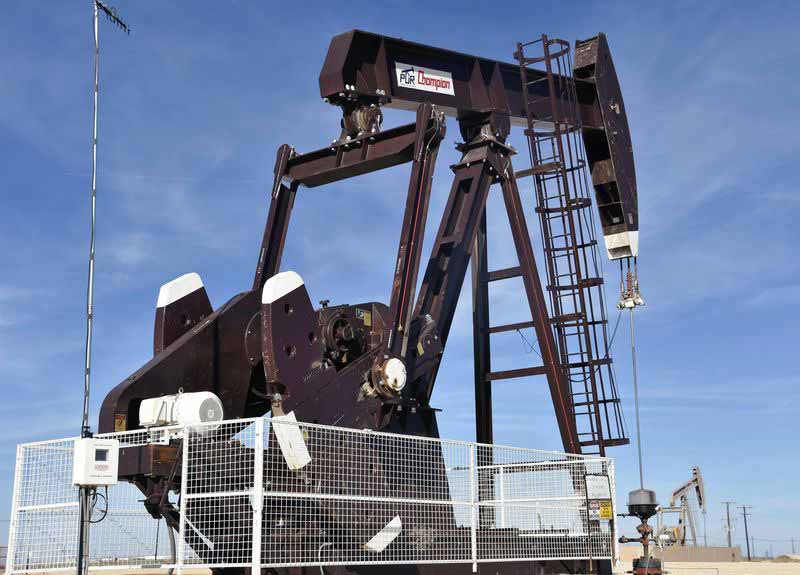
A shale oil production facility in the U.S. state of Texas in February, 2016
November 25, 2021
The decision by six nations, including Japan, to release tens of millions of barrels of oil from their reserves was prompted by growing dissatisfaction with soaring gasoline prices among the public in each country.
Japan announced the step to tap its reserves on Wednesday in tandem with the United States, Britain, China, India and South Korea.
However, it remains unclear whether the move will help to curb the surge in crude oil prices and there is a risk that oil-producing countries such as Saudi Arabia and Russia will be tempted to squeeze output to keep prices up.
U.S. President Joe Biden was confident that releasing some oil reserves would have an impact. “This coordinated action will help us deal with the lack of supply, which in turn helps ease prices,” Biden said in a speech on Tuesday.
In the United States, where people are more reliant on cars compared with Japan, the public is suffering from the soaring prices of gasoline among other things.
Biden’s announcement was clearly aimed at halting the slide in his approval ratings ahead of the Thanksgiving holiday starting Thursday, a time when vehicle use increases as people traditionally visit families and friends.
Some Japanese government officials initially were reluctant to release part of the nation’s state-owned oil reserves. The law stipulates that reserves can be released only in emergencies, such as a shortage of supply from overseas or in the event of a natural disaster. It was not envisaged as a means to lower oil prices.
Economy, Trade and Industry Minister Koichi Hagiuda told reporters Wednesday that Japan “will be in step” with the United States and other nations concerned, and that the government decided to sell a portion of its reserves in a manner that does not violate the Oil Stockpiling Law. Hagiuda emphasized that oil to replenish the stockpile would be bought at a later date. It is thought the decision was made as strong U.S. demands to release oil could not be ignored.
China, which has butted heads with the United States on various issues, shares Washington’s desire to ease the pressure rising oil prices are applying to consumer prices. The coordinated decision was also likely influenced by the arrival of winter in the northern hemisphere when demand for heating increases.
The United States will release a total of about 50 million barrels of oil, which will be the largest-ever dip into its reserves. SMBC Nikko Securities estimates the six nations will release a combined total of about 70 million barrels. Yoshimasa Maruyama, chief market economist at SMBC, predicted the move will have some impact. “It’s possible this could stop prices from rising higher than they are,” Maruyama said.
However, the volume of oil released is expected to be equivalent to the amount consumed globally in 0.7 days. The coordinated release of oil reserves by member nations of the International Energy Agency when the security situation in Libya deteriorated in 2011 had only a limited effect on prices. “The release will have minimal impact on the market unless it’s done over a very short period,” said Tatsufumi Okoshi, senior economist at Nomura Securities.
The price of crude oil for future delivery actually rose Tuesday in the United States, despite the announcement of the coordinated release of reserves. Markets had already factored in the latest decision, and prices had recently been falling.
Even after the decision to release the reserves, the ability of oil-producing nations such as Saudi Arabia and Russia to affect crude oil prices will remain unchanged.
The United States also produces oil. Tighter regulations implemented by the Biden administration, which is pushing ahead with efforts to decarbonize society, have resulted in the shale gas industry scaling down investments and new developments. As the industry’s supply capacity is declining, analysts believe boosting production simply to curb oil prices will be difficult.
The OPEC plus nations — members of the Organization of the Petroleum Exporting Countries and oil-producing nonmembers such as Russia — have agreed to boost production by 400,000 barrels per day each month, a move that further bolstered their clout in the oil markets. Some observers predict the group might bristle at the decision to release oil reserves and adjust their productions levels to negate its impact. All eyes will be on the production plan set to be decided at the group’s next meeting in early December.
Any widening of the rift between oil-consuming nations and oil producers runs the risk of pushing oil prices up even higher.
Top Articles in Business
-

Prudential Life Insurance Plans to Fully Compensate for Damages Caused by Fraudulent Actions Without Waiting for Third-Party Committee Review
-

Narita Airport, Startup in Japan Demonstrate Machine to Compress Clothes for Tourists to Prevent People from Abandoning Suitcases
-

Japan, U.S. Name 3 Inaugural Investment Projects; Reached Agreement After Considerable Difficulty
-

Toyota Motor Group Firm to Sell Clean Energy Greenhouses for Strawberries
-

SoftBank Launches AI Service for Call Centers That Converts Harsh Customer Voices into Softer Voices
JN ACCESS RANKING
-

Japan PM Takaichi’s Cabinet Resigns en Masse
-

Japan Institute to Use Domestic Commercial Optical Lattice Clock to Set Japan Standard Time
-

Israeli Ambassador to Japan Speaks about Japan’s Role in the Reconstruction of Gaza
-

Man Infected with Measles Reportedly Dined at Restaurant in Tokyo Station
-

Videos Plagiarized, Reposted with False Subtitles Claiming ‘Ryukyu Belongs to China’; Anti-China False Information Also Posted in Japan






















